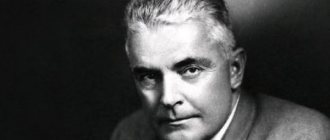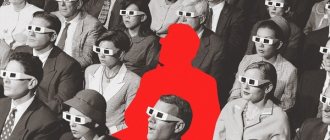Psychological concepts of law arose under the influence of the development of psychology as an independent discipline. At the turn of the 19th-20th centuries. Social scientists began to show increased interest in scientific problems. This was mainly due to the introduction of experimental research methods.
As a result, large scientific schools began to emerge, whose representatives differently understood and interpreted the characteristics of the human psyche. At that time, such movements as Freudianism, reflexology, behaviorism, etc. arose.
Of all the concepts that were formed at the end of the 19th century, the sociological theory of law and the psychological theory of law deserve special attention. Let's take a closer look at them.
L. I. Petrazhitsky
Lev Iosifovich Petrazhitsky was a prominent statesman, deputy of the State Duma of the 1st convocation from the Cadet Party. He developed an original theory of the origin of law. His thoughts are most fully presented in the work “The Theory of State and Law in Connection with the Theory of Morality.”
After the revolution of 1917, Petrazycki moved to Poland. There he began working at the University of Warsaw, heading the department of sociology. Representatives of the psychological theory of law, in addition to Lev Iosifovich, are G. Tarde and J. Fraser.
The essence of the theory
The psychological theory of law was developed by Russian-born scientist Lev Iosifovich Petrazhitsky at the beginning of the 20th century. Its essence is set forth in his work entitled “The Theory of Law and State in Connection with the Theory of Morality.” On this topic, we have already completed a report on
the Sociological Theory of Law (History and Modernity) in more detail. Among the supporters and followers of this theory were: G. Gurvich; A. Ross; M.A. Reisner.
Psychological theory had a greater influence on the generation of ideas in the field of law, including American legal theory of the modern period.
L.I. Petrazhitsky directed his own attention to the psychological side of the formation of legal behavior, taking it even beyond the boundaries of the intellectual side. He believed that the peculiarity of the nature of legal phenomena lies in the sphere of the emotional, in the field of experiences, but not at all in the field of reason.
Are you an expert in this subject area? We invite you to become the author of the Directory Working Conditions
He called this law intuitive, emphasizing its differences from positive law. To the latter he included orders, norms, prohibitions directed against persons who were subordinate to all law and legal relations separately. Intuitive law, according to Petrazycki, reflects the psychological attitude of the addressee to official, objective (positive) law.
Note 1
The father of the psychological theory of law, Petrazhitsky was a professor at the Faculty of Law at St. Petersburg University, and was a deputy of the 1st State Duma from the Cadets Party. After the October Revolution, he moved to Poland and headed the department of sociology at the University of Warsaw.
Petrazycki started from the fact that law is rooted in the psyche of the individual. A lawyer would act in the wrong way, he believed, if he began to look for a legal phenomenon somewhere in the space above or between people, in the “social environment”, etc., while this phenomenon occurs in his own head, in his own psyche, and only there.
Finished works on a similar topic
Course work Psychological theory of law 440 ₽ Essay Psychological theory of law 230 ₽ Test paper Psychological theory of law 230 ₽
Receive completed work or specialist advice on your educational project Find out the cost
Interpretation of law from the perspective of psychology helps to establish legal science on the basis of reliable knowledge that is obtained through independent observation, that is, by the method of introspection; or observation of the actions of other persons.
The source of law, in accordance with the beliefs of the theorist, is human emotions. Petrazycki called his own concept “emotional theory” and found in it a contrast to other psychological legal interpretations that emerged from concepts such as collective experiences or will in the minds of individuals.
Thus, the following basic provisions of the psychological theory of law are highlighted:
- the psychological theory of law, which distinguishes between positive law, which officially carries out its own action in the state, and intuitive law, the basis of which is laid in the human psyche, is formed from what they, their groups and communities experience as law;
- positive law, which is represented by existing regulations, law established by the state, legislative will, in contrast to natural law;
- intuitive right, a person encountered it at every step in his own relationships with other people. Among the various psychological human states, emotions move to the foreground, that is, impulsive experiences that prompt a person to reproduce specific actions.
Emotions
They act as a legal source in Petrazycki’s psychological theory of law. Hence the name of the concept “emotional theory”. The author contrasted his ideas with other psychological theories of the origin of state and law, which were based on concepts such as “will”, “collective experiences in the mind of the individual”, etc. Emotions, according to the scientist, act as a “motor” (motivational) element of the human psyche . It is under their influence that people commit certain actions.
Advantages of the psychological theory of law
The theory focused its attention on the psychological side of the influence of law; it has a close connection with the problems of the psychological mechanism of formation of lawful behavior. And in fact, if the chain of legal prescriptions is translated into the quality of actual lawful behavior of the individual’s experiences and feelings, his psychological impulses become the last link that directly comes into contact with a certain behavior, and in this way determines it. In fact, the law has not received the opportunity to independently regulate behavior in a different way, only through the intellectual-psychological human sphere.
Classification of emotions
According to the psychological theory of state and law under consideration, emotions are divided into 2 types: moral and, in fact, legal. Petrazycki calls the first ones one-sided. He connected them with the individual’s awareness of his responsibility and duty. Moral norms were considered in the concept as internal imperatives.
Explaining his ideas, the author gives the following example. If a person gives alms out of a sense of duty, then he does not have the idea that someone in need of money has the right to demand it. The situation with legal emotions is different. The feeling of obligation (duty) is accompanied by the idea that other persons have authority (as well as vice versa).
Legal emotions, according to the psychological theory of law under study, are thus bilateral. The norms arising from them have an attributive-imperative (providing-binding) character.
Based on these considerations, Petrazycki formulates the following conclusion: a right is assigned to an individual, belonging to him (as his property) is the responsibility of another person.
Ethical Standards
In addition to the duties that an individual performs, the philosopher also took into account ethical standards. He also divided them into several types. The first is called “moral norms”. They are unilaterally obligatory, assert duties independent of others, and prescribe certain behavior to a person. Examples of such norms are the rules of Christian ethics, which describe duties towards others without claims to fulfillment on their part. The second type includes mandatory, demanding norms that establish roles for some members of society, requiring others to fulfill them. What is the duty of some is assumed by others as something due and assigned to them.
Scope of concept
The psychological theory of the emergence of law, developed by Petrazycki, had a number of shortcomings. The author considered all emotional experiences caused by ideas about mutual responsibilities and opportunities to be legal. He considered the rules of games, including children’s games, etiquette requirements, rules of politeness, and so on, to be norms.
In writings on the psychological theory of the origin of law, the author specifically stipulated that norms are formed not through the coordination of the emotions of subjects participating in social relations, but by each person individually. He argued that experiences that take place in the psyche of one individual and are not recognized by other people do not cease to be a right. In accordance with this, the author allowed entering into legal relations with inanimate objects, unreal subjects, and animals.
Criticism
The psychological theory of the origin of law developed by the scientist was not accepted in the legal community. Ideas were also criticized in Russian literature. Legal scholars pointed out the absurdity of some provisions of the concept, without taking into account that the author poses a theoretical problem. The key goal of the scientist was to develop a universal formula of law.
As conceived by Petrazycki, it was supposed to cover various types of understanding of legal science known to history (including contracts with the devil). The psychological theory of law he developed was practically the first, in many ways immature, attempt to trace the formation of norms in the legal consciousness of an individual.
Evaluation of the theory
The emergence of the psychological theory of the origin of the state was, to a certain extent, a great breakthrough in legal science. This became possible only at the end of the 19th century, when psychology began to emerge as an independent branch of knowledge. The interest of social scientists in the problems of psychological science increased noticeably when experimental research methods prevailed in it and large schools began to emerge that diverged in their interpretation of the psyche. The ideas of these schools, adopted by sociologists and lawyers, marked the beginning of the formation of new directions in legal science.
It was rightly noted that the human psyche differs significantly from the psyche of animals. Man has a much more developed psyche. There is a sense of solidarity and a sense of collectivism in it. The merit of the supporters of this theory is the indication that psychological factors play an important role in the process of state formation. Thus, they tried to take a step away from the economic determinism that had completely taken possession of the minds of many. It is also true that the various interests of people (economic, political, cultural, everyday, etc.) are realized only through the psyche. All human actions pass through his psyche at the level of conditioned and unconditioned reflexes.
Orderliness of legal doctrine
The psychological theory of law, developed by Petrazycki, states that numerous legal norms that individuals create contradict each other. At the initial stages of historical development, they were ensured by arbitrariness - the protection of violated interests by the person himself or a group of close individuals.
Subsequently, repression and legal protection became orderly. A system of fixed norms arose in the form of customs and laws, and institutions of power appeared (courts, penal institutions, etc.). State power, implementing the functions of coercion, ensures “certainty of law.”
Mythological and religious concepts
Their common essence is that the origin of the state is explained by the intervention of higher powers, that is, according to the philosophers who create these concepts, the state has its origin from God. These theories include the theories of Plato, ancient Indian, ancient Chinese and some others. For example, a theological theory that became very famous thanks to the works of Thomas Aquinas. It states that the state is a manifestation of both divine and human will; As for power, it can also be Divine and ungodly.
Table “Theories of the origin of the state”
| Theological | Patriarchal | Class | Negotiable | Violence | Voluntaristic |
| State from God | Grew up from family | The result of the class struggle | Consequence of the social contract | Based on submission | different |
Consequences of the development of legislation and customs
The formation of a regulatory framework, according to Petrazhitsky, cannot completely displace the individual’s legal experiences. The author argued that in modern states, in addition to the official legal doctrine, there are a large number of institutions of “intuitive law”. The scientist included the doctrines of the wealthy strata, the peasantry, the proletariat, the bourgeoisie, criminal organizations, and so on among them. The psychological theory of law in this sense approached the concept of legal pluralism.
At the same time, the legal doctrine of social classes and groups was interpreted individualistically. Petrazycki emphasized that the number of intuitive systems of law coincides with the number of individuals.
The essence and history of the development of the direction
The psychological concept of law shows that the state was not based on material values, as Marxist doctrine claimed. They appeared due to a number of mental qualities, experiences and emotions of people. Lev Petrazhitsky argued that individual social groups cannot exist for a long time without legal experiences. A state can be formed only due to a certain state of mind of different groups of individuals.
The essence of this theory is that the individual has a psychological need to be in an organized society, where his actions are limited by social boundaries. At the same time, he must feel and be active within the framework of collective interaction.
Supporters of the movement believe that society was formed thanks to the psychological development of man.
The researchers compared society to a biological organism in which individual parts are interconnected. There is a psychological connection between individuals that allows them to unite in groups to achieve a common goal. From this statement it can be understood that solidarity becomes the main character trait of a person, but identical individuals do not exist. According to physical qualities, there are strong and weak individuals. Depending on mental qualities, two groups of individuals are distinguished:
- Individuals who imitate authorities. They tend to be submissive to others. When executing orders from management, they become calm, believing that they are acting for the benefit of a just cause.
- People who want to control others. They do not know how to follow orders, they have their own opinions on many things, not recognizing the words of others. Their ability to subjugate those around them to their will will allow them to achieve leadership positions.
This theory arose in the mid-19th century, but it gained great popularity only at the beginning of the 20th century.
conclusions
Petrazycki did not make recommendations for the practical implementation of legal policy. The author saw his task as forming the starting principles of the new doctrine and justifying its necessity. He believed that the key position in state legal policy should be given not to coercive measures, but to the mechanisms of motivational and educational influence on the behavior of individuals.
Petrazycki's socio-political views are very close to the ideas of ethical socialism. This concept was also widespread in Russia at the turn of the 19th and 20th centuries.
Petrazycki's teaching was popular among the cadets. His ideas influenced the formation of the views of P. A. Sorokin, G. D. Gurvich and many other adherents of non-Marxist socialism. M. A. Reisner contributed to the rapprochement of psychological theory with Marxism.
The acceptance of Petrazycki's ideas by the followers of Marxism was facilitated by the fact that in the Constitution of 1918 and other acts socialism was characterized as a “stateless system.” It is worth saying that after the establishment of Stalinism and the formation of the concept of a socialist state, Reisner’s followers were criticized for promoting supra-class ethics in society.
Petrazycki's concept interested sociologists. Active research began on the problems of the structure and normative nature of legal consciousness.
Views of E. N. Trubetskoy and M. A. Reisner
Philosopher and lawyer E. N. Trubetskoy points out that solidarity is the main feature of an individual. People differ from each other in their psychological characteristics and in their demonstrated physical strength. At the core of the consciousness of some people is an understanding of dependence on the elite, the legitimacy of certain options for relationships and actions, which brings a sense of stability and calm to their soul. The second part of individuals is distinguished by their desire to subjugate those around them to their will. Such people become leaders in society.
A socio-psychological approach to resolving the issue of the emergence of a power was discovered by M. A. Reisner. In his opinion, the main point in the formation of an empire is ideology, which organizes life in society. The philosopher believed that the main source of state beliefs is the mass psyche of people. The study of the formation of a country is limited to knowledge of the mental experiences that constituted political ideology and an analysis of people's behavior. The state, as the scientist believed, included population, territory and power. It embodied the entire political ideology, namely the influence of race, terror, economic necessity and religion, led by the ideology of law. The state is the product of the population’s implementation of beliefs, norms and principles, which constitute their dependence on various types of power.
Main points
The theory is based on the following ideas:
- Sociological jurisprudence, as well as natural law doctrine, goes beyond the law (positive norms), but not towards natural freedoms, but into the area of implementation, into the area of law enforcement practice. Thus, the right is embodied not in legislative provisions, but in the process of their implementation.
- Positive law is “dead”, “bookish”. It is contrasted with “law in action.” By it, supporters of the concept understood legal practice, actions, application of laws, law and order, etc.
- Law is the real behavior of subjects - legal entities and citizens.
- Judges and administrators are the main subjects of lawmaking. They fill laws with law.
Specifics of theory development
The conceptual formation of the sociological approach occurs when the norms aimed at regulating free competition cease to satisfy the majority of society.
Thus, in the conditions of the development of capitalist relations, the courts, under the guise of interpretation, actually established new legislative norms. As a result, a thesis arose, the meaning of which is the need to search for law not in norms, but directly in life.
After the revolution of 1917, against the backdrop of criticism of previous laws, the sociological concept was actively promoted. For example, P. I. Stuchka called new connections in society law itself. Soon, however, this approach had to be abandoned, since the positive law of the USSR began to take shape, the provisions of which were mandatory.
ORIGIN THEORIES
Theological theory of the origin of the state
The founder of the theological theory of the origin of the state is Thomas Aquinas (1225-1274)
The essence of the theory: the state is the result of divine will.
The state is a product of divine will, due to which state power is eternal, unshakable and dependent mainly on religious organizations and figures. Every person is obliged to obey the sovereign in everything. This theory affirms and defends the thesis “all power comes from God.”
Pros of the theory:
1) The state appears with a monoreligion;
2) Theory allows you to establish order in society;
3) Reflects the objective decisions of that time, namely, the first states were theocratic;
Minus - it is unscientific because it cannot be used to prove or disprove the origin of the state.
Patriarchal theory of the origin of the state
The founder of the patriarchal theory of the origin of the state is Aristotle.
The essence of the theory: the state is the product of an expanded family.
According to this theory, people are collective beings who strive for mutual communication, leading to the emergence of a family. Subsequently, the development and expansion of the family as a result of the unification of people, as well as an increase in the number of families, lead to the formation of a state. The power of the sovereign is a natural continuation of the power of the father, the “patriarch” in the family.
Pros of the theory:
1) The theory rightly draws attention to the relationship between the “state” and the “family”;
2) Allows the establishment of order in society as a result of submission to the “will of the father”;
3) Supports people's faith in the inviolability of the world;
4) Reveals the role of the head of state, which is claimed by a person with extensive life experience.
Minuses:
1) Does not allow us to reveal the process of the emergence of the state in all parts of the world;
2) Doesn’t explain that if the state is a single family, then why is there a war?
3) Does not explain the rigidity of laws.
Contract theory of the origin of the state
The founders of the contractual theory of the origin of the state: Grotius, Hobbes, Locke, Rousseau, Radishchev.
The essence of the theory: the state is a union of people on the basis of a social contract with the goal of achieving common goods.
Social contract theories to a certain extent reflect historical facts.
The state arose as a result of the voluntary transfer by people of part of their rights to a body specially created for their protection and the protection of public order, i.e. as a result of the long natural-historical development of society.
Pros of the theory:
1) The authors noted human characteristics (fear, instinct, self-preservation);
2) Is of a democratic nature;
3) Refutes the existence of a religious principle in the essence of the state;
4) Based on social practice;
Minuses:
1) According to the theory, a person does not obey anyone and does not subordinate anyone to himself;
2) In order to consciously create a state, you need to have at least some idea about it;
3) The contract is the will of the people, which means it can be terminated;
4) The agreement does not have legal force, because it appeared before the state.
Theory of violence on the question of the origin of the state
The theory of violence consists of two parts:
- 1. The theory of external violence;
- 2. The theory of internal violence.
Founders of the theory of external violence: Gumplowicz, Kautsky.
The essence of the theory is that the state is the result of the conquest of one tribe by another.
Pros of the theory:
- 1) Based on many historical facts;
- 2) The result of the conquest is reflected in all aspects of the life of the newly emerged society;
- 3) The state apparatus consists of conquerors.
Minuses:
- 1) Cannot explain the emergence of the state in all regions of the world;
- 2) In relation to the process of the origin of the state, conquests are secondary;
- 3) There are examples in history when it was not the conquest itself, but the threat of conquest that served as the basis for the emergence of a state;
- 4) In addition to the violent path of origin, there is a peaceful path.
Founder of the theory of internal violence: Dühring.
The essence of the theory: the state is the result of violence of one part of society over another.
Pros of the theory:
- 1) People have different interests;
- 2) There is violence in society;
- 3) The state uses violent methods in carrying out its functions.
Minuses:
- 1) Upholding interests can lead to self-destruction of society and the state;
- 2) People cannot be biologically equal;
- 3) The state does not always express the interests of society;
- 4) If a state can be created by force, then it can also be destroyed.
Materialist theory of the origin of the state
The founders of the materialist theory of the origin of the state: Marx, Engels, Lenin.
The essence of the theory: the state arose due to economic reasons: societies. division of labor, the emergence of a surplus product and part of the property, and then the split of society into classes with opposing economic interests.
Pros of the theory:
- 1) The material conditions of society play a very large role in it;
- 2) Changing forms of labor activity, farming, and property affects the emergence of the state;
- 3) During the transition from an appropriating to a producing economy, people are differentiated according to essential characteristics;
- 4) The characteristics of the state are revealed.
Minuses:
- 1) The formation of a state is influenced not only by the economy, but by political and social factors;
- 2) The role of the state in regulating economic processes is underestimated;
- 3) The origin of the state in the world does not follow one pattern.
Controversial issues
When using a sociological approach, there is a risk of blurring the very concept of “law”. If we consider the implementation of norms as it, then clear signs of unlawful and lawful behavior are lost, since the implementation of provisions can be both legal and illegal.
According to the concept, the main subjects of rule-making are administrators and judges. This approach creates favorable conditions for abuse of power by these individuals.
The sociological approach does not have a strong normative basis. In this regard, legal disputes are resolved mainly in favor of politically and economically powerful entities.
Contract theories
A large group of theories consists of natural law concepts, they are also called contractual. Their essence is that the state arises as a result of a social contract; it is beneficial to all people who initially have personal and economic rights, but they transfer part of their rights to the state in exchange for protection. Philosophers also see a number of disadvantages in this concept; First of all, this is a lack of attention to objective factors, for example, of a military-political nature. This group includes the theory of Hobbes, whose supporters believed that in the state of nature people are constantly in antagonism. A person constantly strives for selfish goals and is ready to act aggressively in order to achieve them. Therefore, for the purposes of public safety and the preservation of peace, people were forced to conclude a social contract to establish a state in order to solve their problems.
Contract theory sometimes views the emergence of the state as an attempt to avoid social inequality, but inequality, on the contrary, is increasing. Jean Jacques Rousseau puts forward a draft of a new treaty that will be designed to correct history. This is a community agreement in which everyone's person and property will be protected. The treaty proposed by Rousseau gives the state unlimited power over all people, but it is power directed by the general will. At the same time, Rousseau did not see the need to guarantee the rights and freedoms of people.
Alexander Radishchev held similar views in Russia.
Positive aspects of the concept
Within the framework of sociological theory, the processes occurring in the field of legal regulation are taken into account. They are studied using specific methods of sociological knowledge.
The concept considers public relations to be a priority. In other words, content takes precedence over legal form.
Of course, the sociological approach is of great practical importance for researchers and legislators. To form a correct idea of the legal doctrine and assess the effectiveness of norms, it is necessary to study the provisions in life, with their direct implementation.










